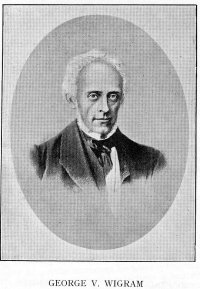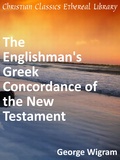Wigram, George
Bible scholar
Biography
George Vicesimus Wigram was born March 29, 1805, and died on February 1, 1879. He was buried in Paddington Cemetery, London. Mr. Wigram was married twice: first to Fanny, daughter of Thomas Bligh (she died in 1834); secondly to Catharine, only daughter of William Parnell of Avondale. (She died on September 12th. 1867, in Canada).
As his name Vicesimus indicates, George Vicesimus Wigram was the 20th child of his father, and the 14th of his mother who was the second wife of Sir Robert Wigram? she being the aunt to the late Charles Stewart Parnell. Mr. Wigram's brother James became a Vice-Chancellor and his brother Joseph became Bishop of Rochester.
When quite a young man, Mr. Wigram obtained a commission in the army. At the close of a day spent in exploring the field of the battle of Waterloo, he had a remarkable experience. There came to him such a revelation of the power of an unseen Presence; such light, such holiness, yet with it the overwhelming love and tenderness of Christ, so revealed as to remove all fear. This was his conversion at the age of nineteen. It was a remarkable conversion, probably indicating the special character of his testimony.
Mr. Wigram was "not disobedient unto the heavenly vision" and, resigning from the army in 1826, he entered Queens College, Oxford, with the intention of becoming a clergyman, but meeting earnest brethren in Christ, he abandoned his studies and commenced laboring for the Lord in London and elsewhere. It has been said that he all but joined Mr. A.N. Groves and his missionary band to Baghdad in June 1829. Two years later the plague broke up the little party, and eventually Mr. Groves became a missionary at Tinnevelly (South India). Shortly after this Mr. Wigram married Miss Fanny Bligh (known when a girl in Ireland) but she was called home in 1834.
While comparatively young, Mr. Wigram had the great satisfaction of seeing completed two works of great value to Bible students, which, with the aid of others, and by his own financial help, were published. They were: The Englishman's Greek and English Concordance to the New Testament(1839) and The Englishman's Hebrew and Chaldee Concordance to the Old Testament(1843)".
It was a little previous to this that Mr. Wigram completed his compilation of hymns entitled Hymns for the Poor of the Flock (1837-38). It contained hymns by Watts, Wesley, Cowper, T. Kelly and others; and an appendix was added, chiefly to include a number of hymns by Sir Edward Denny that had just been written. Then some 18 years later (1856) Mr. Wigram compiled another hymn book entitled A Few Hymns and some Spiritual Songs for the Little Flock, to replace the other collection. In his preface he tells us that he decided to "retouch as little as possible, and with as light a hand as possible, but allow to remain no false, no faulty, no defective doctrine \ cost what it might." This valuable hymn book was revised by Mr. Darby in 1881, and again by Mr. T.H. Reynolds in 1903. In this first edition, many of the older hymns were omitted in order to make room for new ones by Denny, Deck, Darby and Miss Bowly.
It was at the close of his fairly long married life that Mr. Wigram visited Canada in 1867. His wife Catherine, joined him there two months later. She, however, became ill, and was called home after a short illness, dying in Canada. Mr. Wigram was now 62, and in less than four years suffered another sorrowful bereavement in the departure of his daughter Fanny, child of his first wife. Doubly bereaved and lonely, he went abroad to minister to others in self-forgetfulness. Writing in November 1871, from Demerara, British Guiana, he said, "I came out in my old age, none save Himself with me". This led to further travel, visiting New Zealand in 1875 and Australia in 1877. Two years later he died at the age of 74 and was laid to rest with his daughter in Paddington Cemetery.

